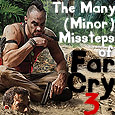
Since video games possess a trait that no other form of entertainment can claim - interactivity - there has always the dilemma for developers to determine where the line in the sand should be drawn: Should they try to challenge the player's skill at the very real risk of scaring many casual gamers off? Should they try to make the game easier so that everyone can play but lacking that feeling of accomplishment? Or should they just go balls-out and make it as realistically hard as they can?
All of these are valid options for a developer, and it's all about the audience the game is being designed for. If it's a game that caters to the hardcore audience, then developers can feel more comfortable about jacking the challenge up. If the game is more mainstream, the developers must adjust the difficulty accordingly so that everyone can see the game through beginning to end.
While each of these options carries its own reward, they each also carry a detriment. Harder games increase feelings of accomplishment and reward for skill, but too many "GAME OVER" screens and you could discourage the player from continuing. Easier games allow everyone to play through an entire game start to finish with little to take them out of the experience, but fail to make the player feel skilled.
Are Today's Games Too Easy?
It's practically indisputable that once games made the leap from 2D to 3D, they got unquestionably easier. The sense of challenge (and frustration) of the games of yore was replaced with the more lackadaisical attitude of the Super Mario 64-era games. One of the catalysts for this was 3D's lack of true depth perception; developers couldn't design as many death-defying leaps since gamers had a much harder time gauging their character's abilities- projecting a three-dimensional environment onto a flat screen doesn't work so well in practice, as developers quickly realized. In addition, technology allowed for deeper (and longer) games that were more story-driven, so it became much more pertinent that a player see a game through.
But at what cost? Games had become far easier, a trend that continues today. Only a choice few games relegate themselves as truly challenging experiences, with Ninja Gaiden being the first example to pop into my head. The rest either project themselves as easier or offer players a choice of what kind of experience they want to enjoy, with probably the best example in recent years being the God of War franchise:
With God of War, Easy and Normal difficulties are not going to really challenge the player too much, and consequently are more representative of today's games. Hard mode allows for more challenge without being too frustrating, but for true old-school gamers, there is an unlockable fourth difficulty setting where the player deals half the normal damage to enemies, who in turn are five times as powerful.
I myself have yet get more than ten minutes through God of War II's fourth difficulty as the challenge is admittedly too great for me.
So are today's gamers "spoiled" from the easier difficulty of today's games? While today's games are easier, yes, are they too easy? Probably one of the best ways to simultaneously answer both of those questions is to compare two relatively recently rebooted franchises, Ninja Gaiden and Prince of Persia. Both games started off as unquestionably difficult games, even for their time, but with their recent 3D reboots, they parted ways.
While Ninja Gaiden stayed true to its roots and kept the player's jaw clenched, blood pumping, and adrenaline surging as they constantly were under the threat of formidable foes, Prince of Persia opted for a different approach. Rather than sticking with the painfully punishing difficulty and stickler controls, the reboot, Sands of Time, went down a much more modern path.
Not only was the game much more forgiving, it was almost ridiculously so, allowing players to literally rewind or slow time (limited use though) to avoid mistakes, and even showed the player a glimpse of what was to come. The Prince moved much more fluidly and was much more acrobatic, and the game relied more on twitch-based skills than memorization and strategy.
So are games too easy today? Probably. While I can't say I miss throwing my controller down in frustration or the artificial lengthening of games through audacious difficulty, it's hard to dispute that beating a classic game is a much more rewarding accomplishment as a direct result of sometimes infuriating difficulty. On the other hand, I feel it is much smarter to strike a balance in a game's difficulty- challenging, not frustrating.
























I have been surfing online more than 3 hours today,
ReplyDeleteyet I never found any interesting article like yours.
It is pretty worth enough for me. Personally, if all webmasters and bloggers made good
content as you did, the internet will be much more useful than ever
before.
My weblog; http://www.nexopia.com/users/debt5hank/blog
my web page: online spiele